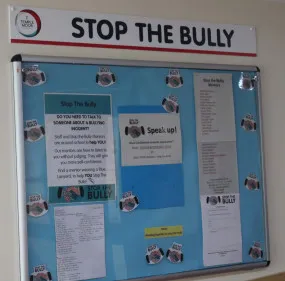Childline - Bullying
Click here >
View navigation
For Students, Parents/Carers

Bullying is the repetitive, intentional hurting of one person or group by another person or group, where the relationship involves an imbalance of power. It can happen face to face or online.
There are four key elements to this definition:
Bullying behaviour can be:
If you require a copy of the school's Anti-Bullying policy, please get in touch and we will be happy to provide this for you.
Conflict is a part of life, it occurs in families, friendships, school, work, and in our society in general.
Adolescence is the phase of life between childhood and adulthood, from ages 10 to 19. It is a unique stage of human development.
Friendships are incredibly important during adolescence. Teen friendships help young people feel a sense of acceptance and belonging. They support the development of compassion, caring, and empathy, and they are a big part of forming a sense of identity outside the family. Moreover, adolescent friendships can be incredibly supportive in helping teens to weather difficult times.
However, part of this phase will bring conflict amongst peers, fallout, arguments and disagreements. Some friends will drift apart whilst others will become stronger.
Conflicts can be seen by parents as bullying – but this is part of growing up. Encouraging good conflict resolution skills to young people will have a beneficial impact.
The skills can help your child to establish healthy relationships, prevent youth violence, set them up for good employment opportunities, and generally be more successful in life.
For further information, please click here
If your child is being bullied, don’t panic. Your key role is listening, calming and providing reassurance that the situation can get better when action is taken.

Not only do we work together to build resilience and self-confidence with the victim of bullying. We teach tolerance, kindness and acceptance and encourage students to speak out about their thoughts, fears and insecurities so that they do not turn to bullying.
Temple Moor is a very diverse school and we want to embrace differences and strive to make sure all students enjoy their time at Temple Moor and leave us as considerate, well-qualified, confident young people.
This includes:
Use this email address to contact someone in school about bullying:
LGBT Tackling homophobic, biphobic and transphobic bullying: improving preventative practices and support for LGBT (lesbian, gay, bisexual, transgender) pupils. Barnados: Everyone should be free to be themselves Barnados support LGBTQ (lesbian, gay, bisexual, trans and those questioning their sexual or gender identity) children, young people and their families in the UK. Check our their website here to find out more.